The Boy with Peace Tattooed on His Skin
An asylum seeker followed every rule. Now he’s buried in a foreign prison.
Francisco’s hands were made for gentleness.
They didn’t shake when he held scissors. His grip was precise, patient, and full of care. In Longview, Texas, where he worked at a small barbershop after arriving in the U.S., clients had already started asking for him by name.
He had a way of making people feel calm as he clipped. Quiet. Safe. It was the kind of skill you could never learn in school. Francisco had learned it alone, years before, in a dim room in Peru, with borrowed clippers and slow YouTube tutorials buffering on a cracked screen.
The Journey
He left Venezuela, the only home he’d ever known, not because he wanted a new country, but because he had to if he wanted to survive. There was no future. Death was a real risk he ran every day. The country was quickly falling head first into a humanitarian crisis that is still happening now.
Then he went to Peru. Then back again. He followed the promise of safety like a whisper in a storm. America was supposed to be the end of that search.
The place where tired men could lay down their burdens. The place that once etched its welcome into copper and stone: Give me your tired, your poor, your huddled masses yearning to breathe free.
Francisco believed that still meant something. That the torch held high in New York Harbor still burned for the lost. That the land built by immigrants could never turn its back on them. He did not know the inscription had faded in the minds of those now in power, grown faint beneath ash and fear.
So in December of 2023, he arrived at the U.S.-Mexico border. He didn’t sneak through the brush or crawl under a fence. He walked to the gate and asked for asylum. He had nothing to hide. Nothing to lie about. He gave them his real name. His real story. His real scars. He had recently injured himself falling from a train trying to make the journey. He was detained to be processed.
For two months, he was kept in a cold holding facility in Dallas. The heat wasn’t working, or maybe it simply wasn’t turned on. The air inside those concrete walls stayed sharp, the kind of cold that gets into your bones and makes your teeth ache.
These private, for-profit ICE detention centers are paid $150-200/day per person in their facility. All paid by the U.S. government with your tax dollars. So, why is it so hard for them to provide for their basic needs while their CEO’s intake billions every year?
He tried to sleep curled into himself, arms crossed tight over his chest like armor. Agents asked about his tattoos. It’s always the tattoos. They weren’t menacing symbols. They were names: his mother, his sisters, his grandmother. On his arm, in soft, careful script, a single word: paz. Peace.
Eventually, a judge reviewed his case. There was no criminal record. No reason to believe he posed a threat. He was released with an ankle monitor, told to check in, to follow the rules, to wait. And he did. He worked. He saved. He called home often and promised his mother he would soon be able to send for her. He dreamed of buying land and building a little shop, maybe with a mural on the side and two chairs inside.
He still believed the law would protect him. He still believed this country meant what it said about fairness. Home of the free, they said.
The Knock that Should’ve Never Come
It was February 6, 2025.
In Longview, Texas, Francisco was finishing up a haircut. He had a few more appointments that day, nothing special. Maybe he was tired. Maybe he was thinking about dinner or whether the ankle monitor was chafing more than usual.
He wasn’t worried. He had no criminal record. Not here or Venezula.
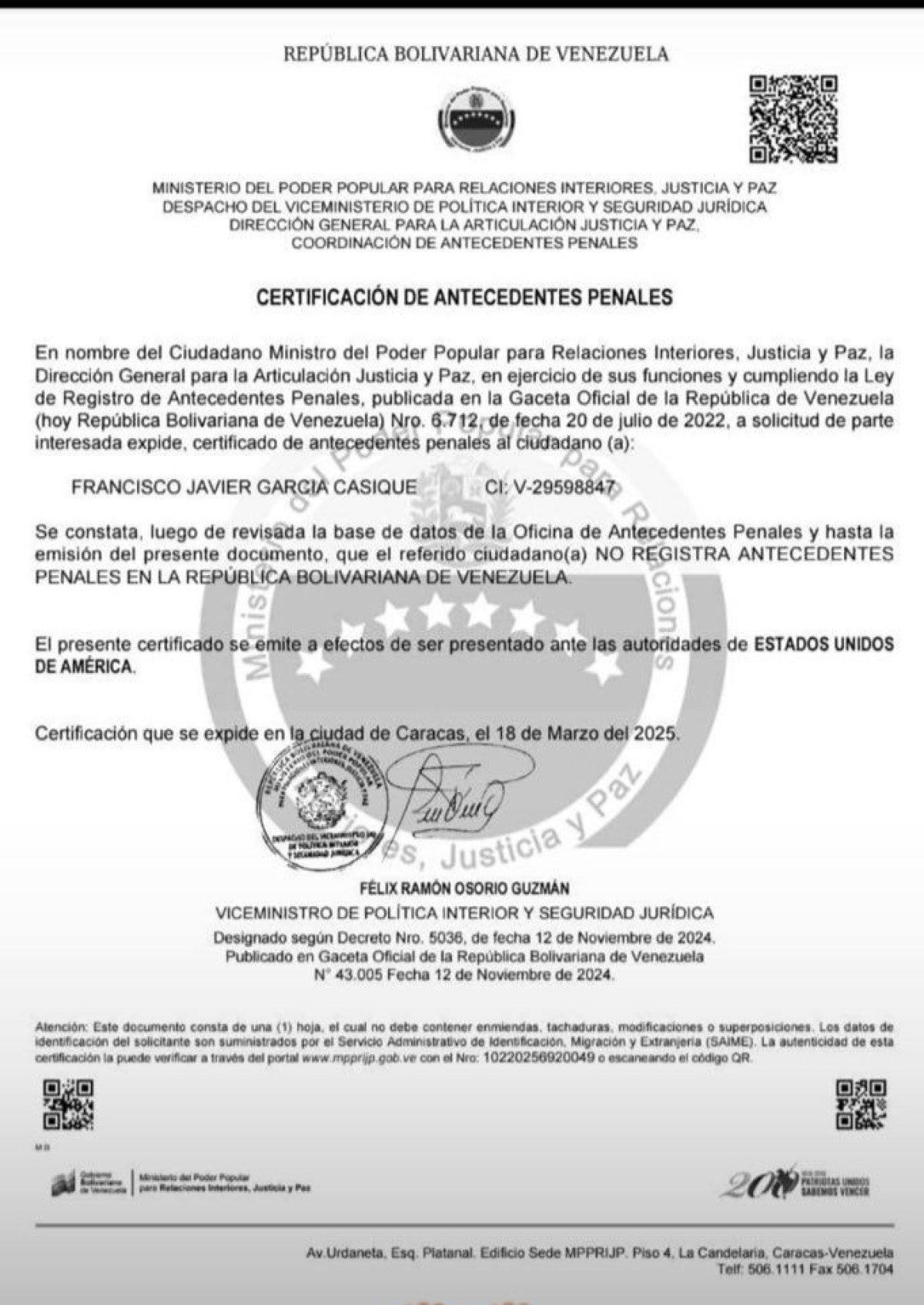
He had followed every rule. He’d checked in with ICE. He’d stayed off the radar. Francisco Javier García Cacique was in the process of seeking asylum. He was living and working legally in Longview, Texas, awaiting the outcome of his asylum process, when he was re-detained without warning or reason that day.
When they came for him, they didn’t knock like people do when they mean well. They didn’t explain. There was no court summons. No letter. No call. Just the suddenness of it. Handcuffs cold against his wrists. A van with dark windows.
His phone went dark.
Thousands of miles away in Maracay, Venezuela, his mother, Mirelis, stood in the kitchen holding her phone, her thumb hovering over his name. She had a habit of checking in around this time, not because he needed her to, but because that’s what mothers do. They know the rhythms of their children. The silences between calls. The tone of a tired hello.
She called once. Then again. Then five more times. Nothing.
At first she told herself he must have misplaced his phone. Maybe the charger broke. Maybe he left it at work. These were the lies you tell yourself when the truth is too large to look at directly.
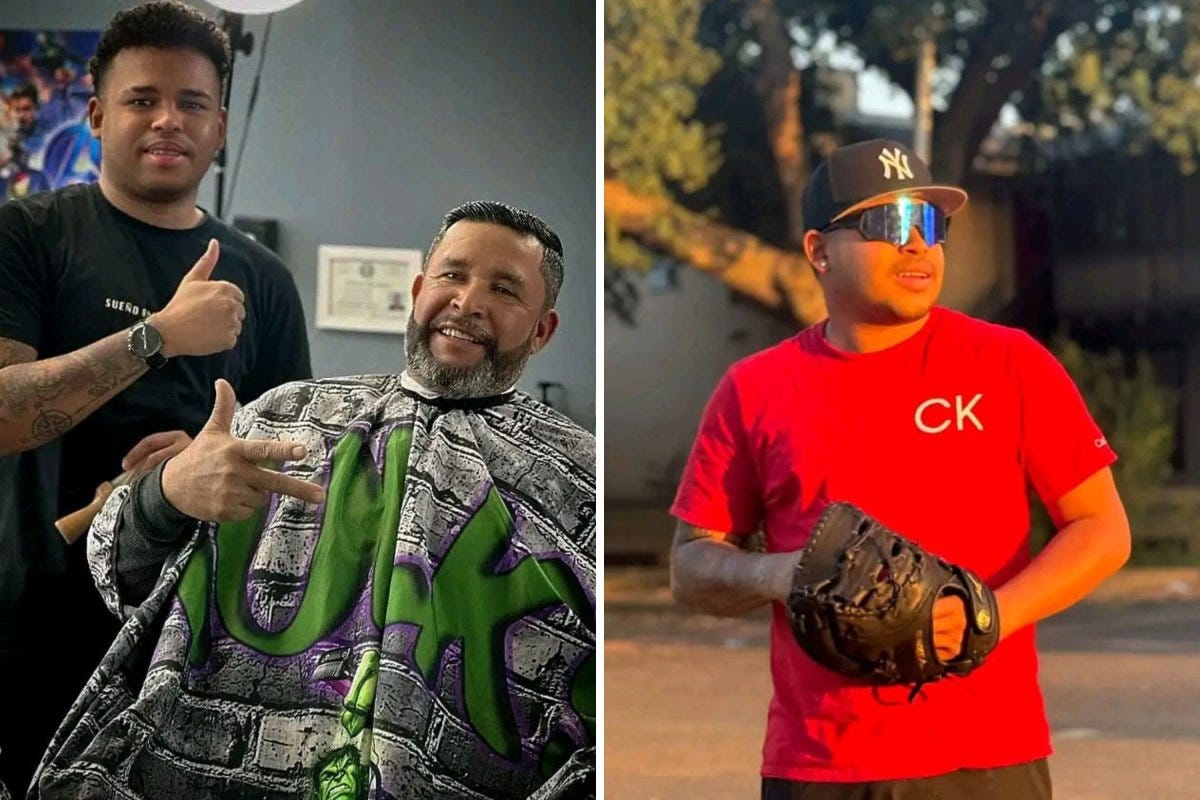
That night, she didn’t sleep. She sat upright on the couch in the dark, the plastic of the remote sticking to her palm, her body still except for the quiet motion of prayer. Not the kind said with confidence. The kind said with bargaining. With trembling. With a knot behind the ribs.
What if he’d been in a car crash?
What if someone had robbed him on his walk home?
What if he had collapsed in the street and no one had noticed?
Every possible fear made its way in. She imagined him alone. In pain. Cold. Dead.
The thing about being a mother is that your mind doesn’t stop at worry. It drags you all the way to grief and then sits you in it, dares you to keep breathing. She scrolled through his old messages. The last one said, “I’ll call you after work, Mami.” She stared at the word Mami until it blurred.
What she didn’t know was that the decision to take him had already been made weeks ago. The papers were signed. The flight manifests drawn. The names of boys like hers printed in lists that would never see daylight. What she didn’t know was that as she sat there that night with her rosary clenched in one hand and her stomach twisted in dread, her son was already gone.
The Trump administration had pulled an old law from the bones of American history. The Alien Enemies Act, 1798. A law made for war. Not for barbers but Francisco’s brown skin, his Venezuelan passport, and his tattoos, tattoos of women he loved, were enough. That’s all it took to mark him as dangerous. They didn’t need evidence. They needed bodies. Headlines. Men to vanish so others could cheer for them.
They never said his name. They never charged him. They never told Mirelis where her son had been taken. He had been turned into an absence. A blank space on a bench where he used to sit and drink coffee. A missing voice at the end of the phone line.
In secret, they loaded him onto a plane and he was disappeared by the US government.
The First Glimpse
Mirelis first saw her son again in mid-May. It wasn’t how she had imagined it. There was no call. No visit.
She was sitting on her couch, phone shaking in her hands, watching a video clip from One America News. The footage had been taken during a prison tour by Matt Gaetz, who stood grinning on camera as Salvadoran guards unlocked the gates to the newest wing of their mega-prison: CECOT. Over 200 Venezuelan men had been placed there. None had access to lawyers. None had been tried.
Francisco was in the background of a wide shot.
His brother saw him first. His beard had grown in. He looked thinner. His hands were gripping the steel bars. He was shouting. Something indecipherable at first, but then clear:
“Libertad!”
Freedom. He was shouting freedom. Then came the gesture. The one that broke her. He folded four fingers over his thumb. It was the universal sign for help.
“My soul hurts,” Mirelis said. “We were searching for him, and we found him. But he’s very thin. Very. And that sign… asking for help… it’s been hard to see. But also a relief. Because he’s alive.”
She watches the clip over and over.
Sometimes she plays it on mute, staring into the hollow of the screen, trying to memorize his posture, the way his fingers clutch the bars. Other times she plays the volume loud, listening for his voice among the shouting. She can’t decide which is worse the silence that lets her imagine, or the noise that makes it real.
It is the only way she can see her son
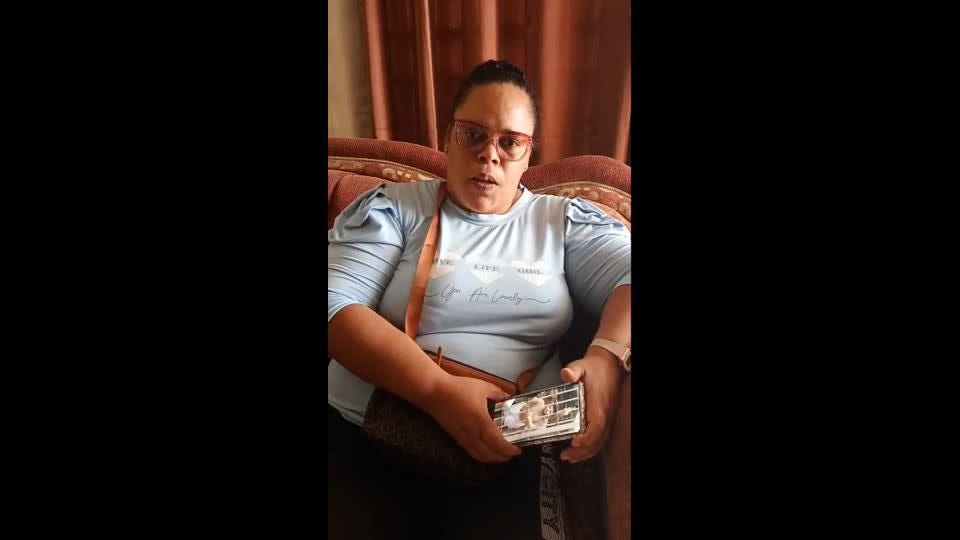
Her baby boy. The one she grew inside her body. The one she fed at her breast when she had barely enough for herself. The one she bathed in a plastic tub in their cramped apartment. The one who used to fall asleep against her chest, sweaty and warm, his breath smelling faintly of milk.
She changed his diapers. She dressed his scrapes with kisses and cotton. She taught him to speak. To pray. To believe that the world, for all its pain, still had room for good people.
His brown hair held the warmth of the day, the dust of the street, the scent of soap she could barely afford. She would hum as she washed it, fingers working carefully through the knots, never rushing.
And then there were his eyes.
Dark brown, like hers. Like earth just after rain. She used to say they were too big for his face when he was little, always watching, always wondering. He had that gaze that made people pause. Not sharp, not suspicious.. just deep. Knowing. He would look up at her as she dried his hair with the same towel they'd used for years, his lashes heavy with water, his face open and unafraid.
She looked into those eyes every day of his childhood. They were how she knew he was okay. Now, she doesn’t know if she will ever see them again.
Now, all she has is this: a grainy prison video on her cracked cell phone, filmed by a politician she’s never heard of, aired on a network she doesn’t understand, from a country that took her son and buried him in concrete.
She squints to see past the pixelation, searching for the boy she raised inside the frame of the man they caged. She looks for signs he’s still in there. That he still remembers her voice. That he hasn’t been erased entirely.
It is not a visitation. It is not a phone call. It is not a letter. It is surveillance dressed as mercy. This is the only glimpse she gets. Her only hope.
She clings to it like a lifeline. Because as long as she can see him, as long as she can hit replay, he is not gone. Not yet. But every time the video ends, and the screen fades to black, it feels like mourning all over again.
A Barber in a Tomb
CECOT is not a prison designed for rehabilitation.
It is a monument to fear. A concrete coliseum built not to correct but to crush. Raised in just seven months under El Salvador’s president Nayib Bukele, it stands not as a facility of justice but as a spectacle of submission. Its cells are enormous, lightless vaults stacked with human bodies , seventy men at a time, pressed into rooms without windows, without beds, without mercy.
There is no privacy. No silence. No sleep.
It’s heartbreaking, really. He once held clippers like they were instruments of care. In his hands, they buzzed gently, shaping fades, softening lines, giving dignity to the men who sat in his chair. He used to steady nervous clients with a quiet voice, calm children with a smile, always asking, “Like this?” before making the first pass. Clippers, to Francisco, were not just tools. They were how he built trust. How he survived.
But when he arrived at CECOT, they were used against him. Just like all the other innocent men sent there by the Trump Administration.
Not in kindness. Not with care. There was no mirror. No gentle hand. Just a guard barking orders and steel teeth shearing his hair to the scalp. Not for hygiene, but for humiliation. He felt the cold snap of the blades on his head, the sound sharp and hollow in the concrete tomb where no man had a name, only a number.
They took the very thing he used to make people feel human and turned it into a weapon to strip him of his own. No cape. No chair. Just clippers pressed into his skull like punishment, as if cutting away his hair could erase the person he used to be.
Each cell has a bucket for urinating. Another for water. A hole in the floor for defecation, surrounded by men trying not to look. The air is thick with the sour weight of sweat, rot, and human waste. The lights never go off. Time does not pass here. It just bleeds forward, shapeless and cruel.
There are no books. No phone calls. No letters. No news from the outside world. Just concrete and orders barked in a language Francisco does not understand.
And guns.
The rifles come often. Guards with cold eyes sweep the cells with barrels pointed chest-high. They shout. They laugh. Sometimes they make the men strip naked and squat in lines. Sometimes they leave them that way for hours.
This is where the United States sent him. Not back to Venezuela, to the mother who still sets a place for him at the table. Not to a courtroom, where facts might have mattered. Not even to a jail.
They sent him to a place designed to break people. Francisco does not belong here. He is not a murderer. Not a gang leader. He is a barber.
The kind boy with quiet hands who once clipped hair in a Texas shop now sleeps on a slab of metal in a pit where hope is forbidden.
The boy who made shy children laugh with crooked smiles and steady fades is now herded like livestock in a prison so notorious that El Salvador’s own justice minister said: “The only way out is in a coffin.”
Francisco knows this. He hears it in the way the guards walk. In the way the food is thrown instead of served. In the way men disappear from the cell and do not come back.
His only crime was believing in America.
He came with nothing but hope and callused hands, expecting a fair hearing. Expecting a country that meant what it said at the base of the Statue of Liberty. He asked for protection. Instead, they gave him chains. They handed him to a foreign government and told the cameras they had deported a criminal.
They never said his name. Now the gentle boy with the word paz (peace) tattooed on his skin lives in a place where peace cannot enter.
He does not know if his grandmother is still well, if his sister finally passed her nursing exam, or if his mother still cries in the kitchen when the power goes out at night. He doesn’t know if they know where he is. He hardly knows himself. If they saw the video. If they recognized him through the blur of the camera, in the boy with the tired eyes and hollow cheeks shouting for freedom from behind steel bars.
He does not know how long he has been there. He does not know what he did wrong. He does not know what is happening to the women whose names are inked on his skin. He only knows that there is no door and that the light above him never goes out.
Francisco is not a mistake or an exception. He is evidence. Evidence that the promise etched on the Statue of Liberty can be hollowed out and rewritten by fear.
Evidence that you can do everything right and still be thrown away. They did not just disappear him from the country. They disappeared him from the record, from the news cycle, from the rights he was told he had. And for what? To make a point. To feed a narrative.
To parade his brown body in front of cameras and call it justice. But he is not a symbol. He is a son. A brother. A barber. A man. And he is still alive, somewhere in that concrete tomb, gripping the bars, calling out for a world that once told him he was welcome.
If we leave him there, if we stay quiet, if we choose comfort over truth, then it is not just Francisco who will vanish. It is the country we thought we were. The light is still on above him. We must not let it be the only one.
Call: Use the U.S. Capitol switchboard at (202) 224-3121 to be connected directly to your senators and representatives, or use the free five call apps.
Organizations like the ACLU are actively working to challenge these deportations and support affected individuals. Consider supporting their efforts and staying informed through their updates: ACLU Action on Wrongful Deportations.
Email: Find your senators' contact information at www.senate.gov/senators/senators-contact.htm and your representatives' at www.house.gov/representatives/find-your-representative.
This piece is not behind a paywall. It never will be. Stories like Francisco’s should not be locked away for only those who can afford to read them.
If you believe in this kind of reporting the kind that holds power to account and gives voice to the disappeared you can subscribe for free to help it reach more people. And if you're able, you can support this work with a paid subscription. But you don’t have to. The truth will always be free here. Because it has to be.

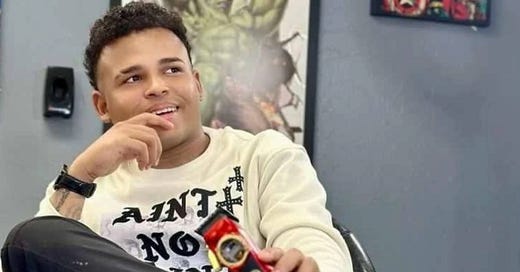



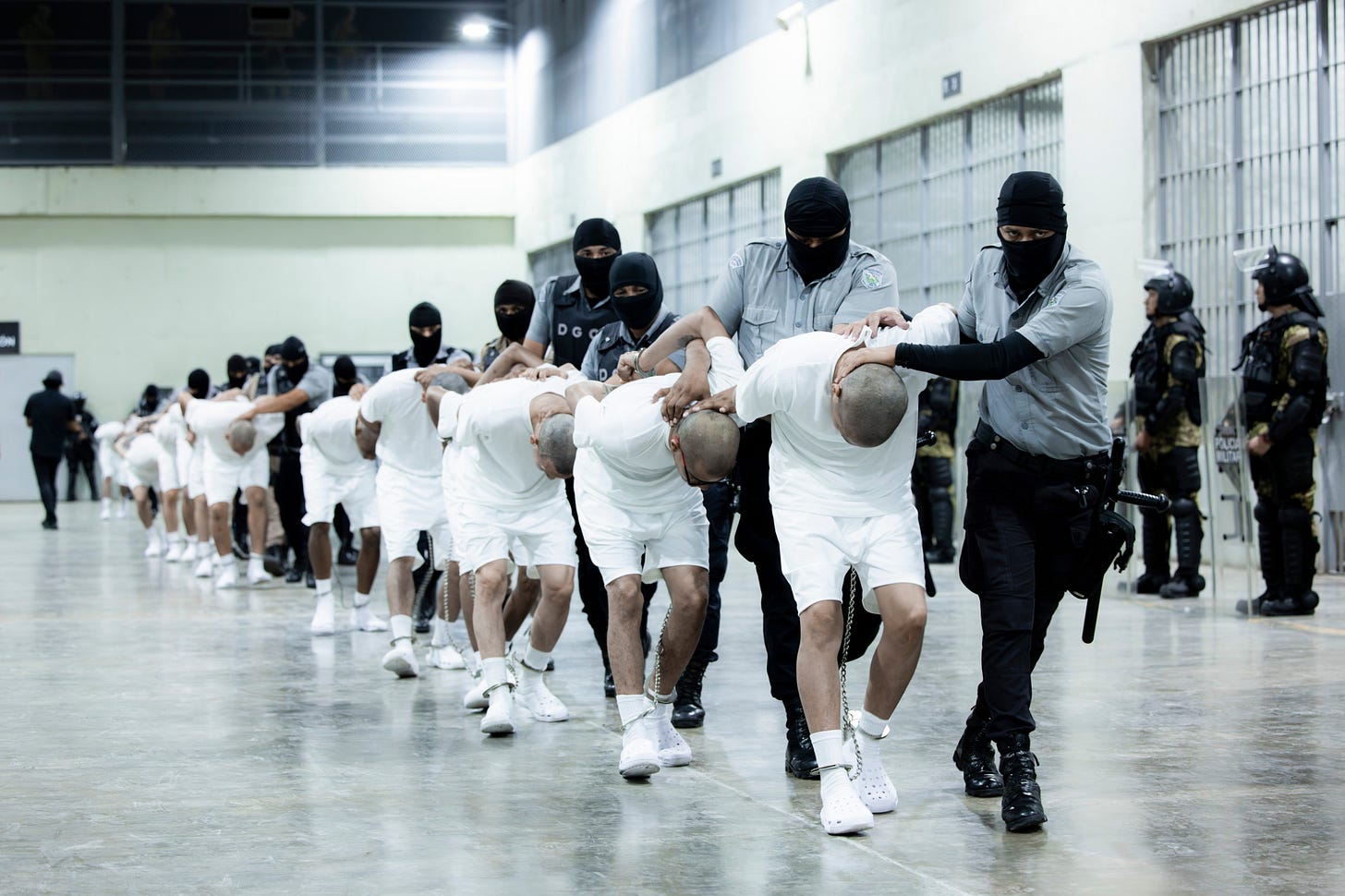

My latest email to my Republican Congressman:
"Did you ever wonder what you would have done as the Nazis were rising to power, Congressman Amodei? YOU ARE DOING IT RIGHT NOW. Innocent (UNTIL PROVEN GUILTY!) men are being held right now in an El Salvadoran prison. Illegally. Unconstitutionally. In concrete cells, shitting in holes in the floor. No rest. No privacy. NO TRIAL PROVING THEY DID ANYTHING WRONG.
You sit in a position of power and SEEM to be doing nothing to stop this evil. You say "the people of Northern Nevada voted for this," but if they voted for fascism and to suspend the Constitution, YOU have the responsibility to ignore their "wishes" as per the Oath you swore. If they voted out of ignorance, YOU have the responsibility to protect them from the consequences, per the Oath you swore...to the Constitution...to protect against enemies foreign AND domestic. Just like my Army son and Navy son did. Are bomb makers the only domestic enemies you can imagine? Imagine a DOJ that ignores the CONSTITUTIONAL PROTECTIONS of people on our soil. That DOJ is a domestic enemy.
You have my name, address, phone number and email. I'm giving these to you fearfully, knowing they could be used against me by this evil regime that disappears people. Citizens...lawful asylum seekers...maybe by next year...white grammas who speak out? I speak out with fear, knowing that I must do something to try to inspire you to courage...to heroism...in spite of what fear you might be feeling. It is past time to claw back Congressional power. To stand up for our children and grandchildren and all those without the power you hold. Be a hero or be complicit. The choice seems crystal clear to me. Historians, if they survive, will write tales of people who stood up against autocracy in the US and people who looked the other way or enabled it. Where will the name "Mark Amodei" appear in their tellings?"
Uggghhhhh……
We must not forget these stories.